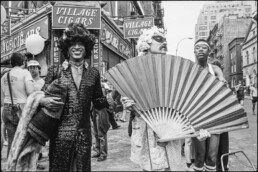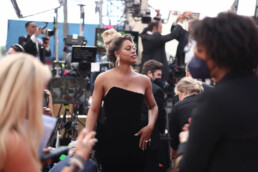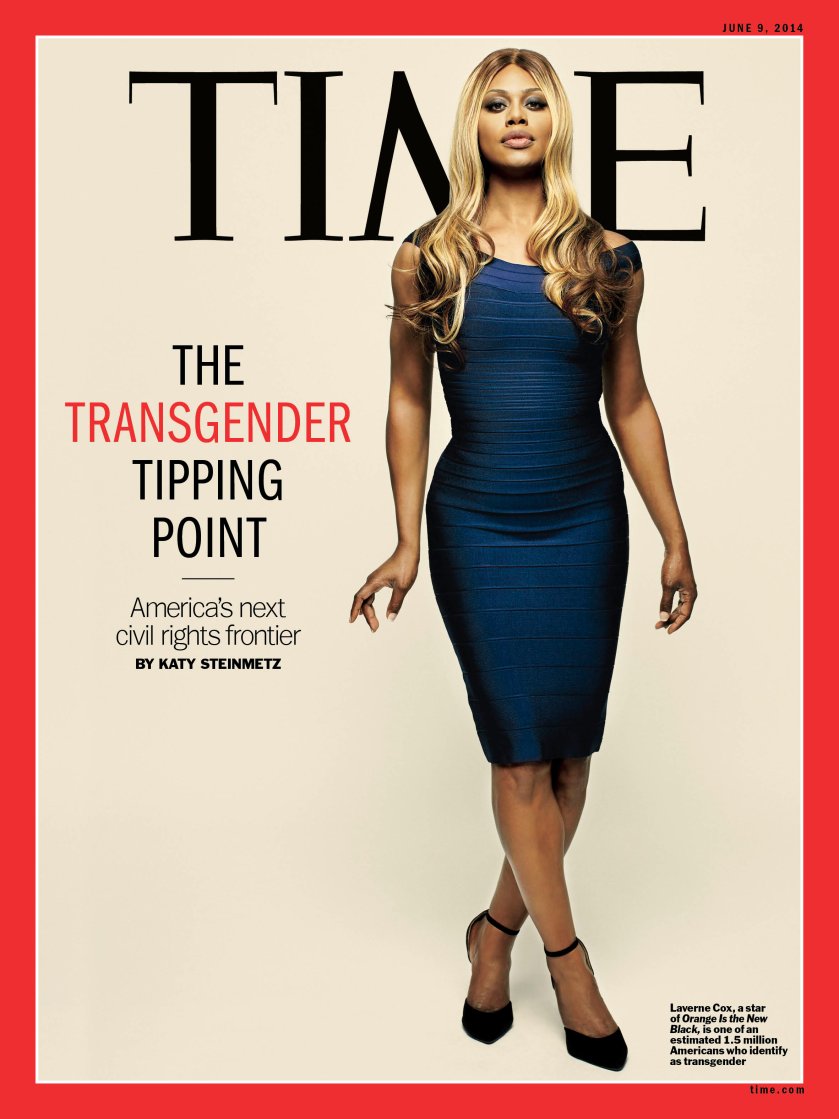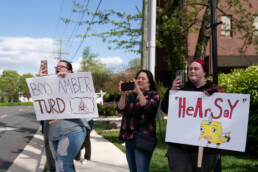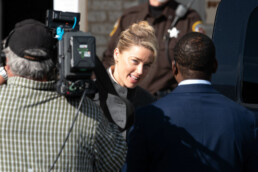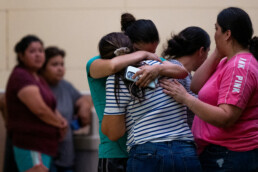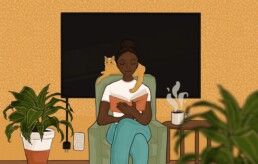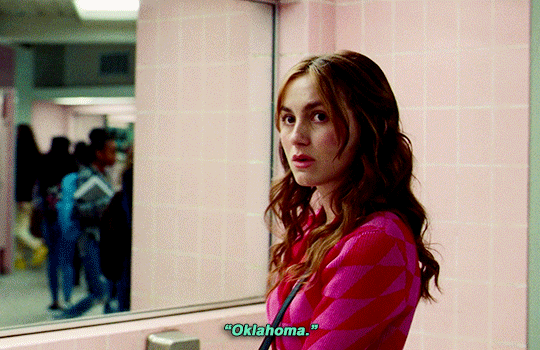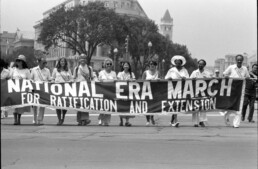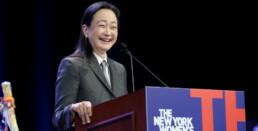The supposed "death of #MeToo"
|
No images? Click here  June 8, 2022 Dear Meteor readers, Like me, you’ve probably been completely fixated on Lori Harvey and Michael B. Jordan breaking up. (Oh, no? Just me?) They were just so beautiful! The fan reactions have been WILD (short version, since it’s clear you haven't been following: Harvey chose herself), but fundamentally, the whole thing is none of my business, and neither is the fact that Feminist Icon Keanu Reeves was seen holding hands with his girlfriend this week, which feels like a satisfying incident of gender justice. At any rate, celebrity stories are meant to be an escape from political life as we know it, which is yet another reason the Johnny Depp/Amber Heard trial was such a bummer. It inspired an orgy of hate against Heard, and in this issue, Meteor editor-at-large Rebecca Carroll sat down with Pulitzer Prize-winning journalist, scholar, and activist Salamishah Tillet to understand what it all meant—for the legal system and for survivors. But, first, the news. 🥰, Samhita Mukhopadhyay  WHAT'S GOING ON“We were betrayed”: Justice for the victims of former USA Gymnastics and Michigan State doctor Larry Nassar has been elusive. Over 90 of them are now suing the FBI for mishandling the investigation into Nassar, which resulted in him continuing to abuse young women for months after a first victim had come forward. Listed among the plaintiffs are gold medalists Alexandra Raisman, Simone Biles, and McKayla Maroney; the lawsuit, which calls for a total of about $1 billion in damages, comes after the DOJ failed to prosecute the FBI for the agency’s “gross failure” to properly investigate Nassar. I for one cannot wait until this army of extremely athletic women (metaphorically) beats the FBI into such submission that they have to change the name of the J. Edgar Hoover Building to the All the Girls You Couldn't Silence Building. Tits out for abortion: On Tuesday night the WNBA’s New York Liberty absolutely shellacked the Minnesota Lynx in Brooklyn. But not before a group of topless women stormed the court (which is very dangerous to players and officials btw!) to advocate for abortion rights. Some of the protestors, who were apparently with Rise Up 4 Abortion Rights, ran on the court topless, while more unfurled a large green banner that read, “Overturn Roe? Hell no!” The on-court protestors were removed by security and in response, the organization tweeted, in part, “We are calling on those who can stop the overturning of #RoeVWade: THE MILLIONS of ppl who support #abortionrights. YOU! No business as usual. Shut the country down!” And while we're at it, don't forget you can do your part by donating to local abortion funds. AND:
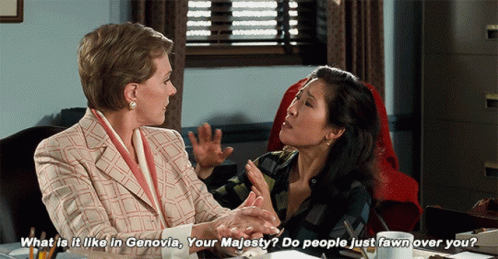  AFTER THE VERDICT#MeToo Is Not DeadBut the justice system is on life support.BY REBECCA CARROLL  THE INCOMPARABLE DR. SALAMISHAH TILLET (PHOTO BY EMMA MCINTYRE VIA GETTY IMAGES) The Johnny Depp v. Amber Heard trial was in turn high camp, a searing commentary on celebrity culture, and a fairly excruciating thing to watch if you have any personal experience of sexual assault. I wanted to talk it—and the verdict—through with someone to make sense of it all. So I sat down with Pulitzer Prize-winning journalist, scholar, activist, and survivor Dr. Salamishah Tillet, whose organization A Long Walk Home empowers people to end violence against girls and women. Rebecca: It has been almost a week since the Johnny Depp/Amber Heard trial ended. You said you did follow it. In what way did it feel like news to you? Salamishah: Well, there are three parts. There was the actual trial itself, and the ways in which Amber [Heard’s] op-ed was under such scrutiny for defamation—that’s an unusual response to what we think of as a #MeToo allegation, to have a high-profile person like Johnny Depp using the court system to defend himself from accusations of violence. And then there was the intense fan frenzy in which people traveled great distances to just sit outside the courtroom to catch a glimpse of Depp. And finally the online aspects—a lot of real vitriolic attacks against Heard. All of that made it newsworthy to me. Rebecca: I know a lot of women and survivors of sexual assault, myself included, who had moments of feeling triggered or just despondent, hopeless, or enraged while following the trial. How did you feel? Salamishah: I felt deep compassion for her. But also I think the hardest part was to [witness] “bro culture” turn into celebrity addiction. It's interesting to see how these people can remain heroes and remain worthy of being idolized. And I think violence against women is not just commonplace, but something that's taken so lightly that you can have thousands of people celebrating Johnny Depp as an actor, and therefore, that means that it was impossible for him to commit any acts of violence against her. I mean, that's the part that's disheartening, right? As if we needed any other mechanism for silencing people, we have a high-profile case showing how effective this process may be to sue someone for defamation if they've accused you of gender-based violence.  EVEN THE DOG DOESN'T UNDERSTAND WHY THESE PEOPLE ARE WASTING THEIR TIME WHEN JOHNNY DEPP WASN'T EVEN AT THE VERDICT READING (PHOTO BY KENT NISHIMURA VIA GETTY IMAGES) Rebecca: I’m curious what you think about the inordinate amount of disdain for [Amber Heard]. Salamishah: Amber Heard was alone essentially. Depp had a support system created by his wealth, his celebrity, his gender, and race that she just didn't have. It proves again that you actually need an arsenal to counter men in power. It was a complicated case, yes, but it was a very lonely place for her to exist in. There was no support compared to what Johnny Depp had. Rebecca: I want to go back to what you were saying about the legal implications of this defamation win. As someone who is a lifelong activist in this space as well as a survivor, what do you think it means? Salamishah: I’m working on this big project called In Lieu of the Law: #MeToo and the Politics of Justice. And I bring that up because [as a result of #MeToo and other movements], we may have these personal disclosures, and this really private healing, but we still don’t have any legal justice. I went to the assistant district attorney in Philadelphia [where my assault took place], but at the time, in 1992, physical coercion had to accompany a sexual assault. My sexual assault didn’t fit under the legal definition of rape. It does now because people have advocated to change those laws. But at the time, no means no, wasn’t enough. The person had to threaten your life, and also sexually assault you. And even though the laws are more expansive now, and the cultural attitudes may have shifted, we're still butting up against legal systems and legal parameters that make it easier for people to get away with violence against women. And that's essentially what we saw here too. Because I was sexually assaulted in college and because I’m a college professor, I really pay attention to the college movement that preceded the #MeToo global movement. [And during] the college sexual assault reform movement that dominated the first decade of the 2000s, students would come forward with allegations of sexual assault and started suing their universities under Title IX protections. What’s fascinating is that now we’ve seen a really strong backlash from mostly men—mostly white men—who’ve been accused of sexual assault, suing the university. And, oftentimes [they] either have their records unblemished or been able to receive restitution from the university. To me, that is an indicator of the trend that we’re going to also see with these #MeToo cases. It’s already been tested in college and university environments.  STUDENTS AT PACE UNIVERSITY DURING A WALKOUT AGAINST SEXUAL ASSAULT ON CAMPUS, 2018 (PHOTO BY DREW ANGERER VIA GETTY IMAGES) Rebecca: So if we’re talking about the way that the #MeToo movement or your organization A Long Walk Home are creating “safe spaces” —there’s this real discordance with what is happening in the actual legal system. Salamishah: There's a really good book—it’s called Redefining Rape by Estelle B. Freedman, and she looks at rape reform movements in the suffrage era and the Jim Crow era. And she opens this book with this really obvious but really important idea that the laws around sexual violence or gender-based violence have always protected a particular class of Americans—and that's disproportionately white men. So it’s not as if this moment is ahistorical in that sense. We're just seeing more sophisticated ways of challenging accusations of violence against women—the novelty of the [defamation] claim was pretty surprising—but it's part of a larger history. Rebecca: I was struck by something that [me.too movement founder] Tarana Burke said in her statement after the verdict was announced, in response to media speculation that the #MeToo movement is dead. And she said, “The movement isn't dead, the system is dead…In the meantime, millions of people who have never been able to utter the words, 'It happened to me' have released this shame that wasn't theirs to carry in the first place.” Salamishah: I published my story of multiple sexual assaults in my feminist college newspaper in 1997. And so that was my kind of #MeToo moment, in terms of revealing my story, the trauma that I had experienced, and wrestling with the shame and the self-blame that so many victims have. So I clearly remember. And I'm a writer, so for me to write that publicly was cathartic, and I think a transformative moment for me politically and personally. In that sense, I think #MeToo as a global movement is both an epiphany, Oh, I am a victim of violence, and the public acknowledgment of the trauma. That’s what’s historic about #MeToo—this global coming together. I think that is pretty remarkable, and still is part of its seismic, shifting legacy. Rebecca: And so what would you say to young women and girls—survivors—about how we move forward from here, facing a “dead” system? Salamishah: It’s on us to continue to agitate for reform in terms of legislation, in terms of the criminal justice system, and in terms of the court of public opinion. Otherwise, people will continue to be harmed without any repercussions. And so it's on us for using what Tarana said is a dead system. It's on us to revive it or revolutionize it. So that’s what I think. Rebecca: Well, all right. God damn. |
*A previous version of this post misstated the race of the two men Kyle Rittenhouse killed. It was wrongly stated Rittenhouse killed two Black men; however, it was two white men. The Meteor regrets this error and has updated the post to reflect accurate information.
![]()
"Happy" Pride?
|
No images? Click here Dear Meteor readers, Happy Pride! Or…is it? Since there have been (checks watch) more than 300 pieces of anti-LGBTQ+ legislation introduced so far in this short, stressful year, we wouldn’t blame you for wondering exactly how festive to feel. So how do you celebrate during a backlash? I asked my dear friend and former Teen Vogue colleague, Phillip Picardi, and he was emphatic: He is celebrating. This year, he told me, “we need to define our pleasure in order to identify what is worth fighting for, what's worth protecting and nurturing.” Phill joins us in today’s newsletter, in conversation with another friend: trans writer, activist, editor, and all-around icon Raquel Willis, about how to move beyond just celebrating Pride to using it as an opportunity to remember our history and clarify the priorities of the LGBTQ+ movement. But first, the news! Sippin’ slushies, Samhita Mukhopadhyay  WHAT'S GOING ONLeaning out: Billionaire Sheryl Sandberg is stepping down from her role as COO of Meta, formerly known as Facebook, aka your favorite home for disinformation and flourishing white-supremacist conspiracy theories. Sandberg, prior to being one of the faces of democratic erosion, was the head captain of workplace feminism through her New York Times best-selling book, Lean In. The book was a hit and a miss—both a refreshing, sometimes galvanizing voice in the change-resistant world of tech and business, and also, at its heart, a tome to individualistic, corporate feminism. Perhaps Sandberg, too, has accepted that you cannot have it all (even when you do have it all). In a statement posted to, obviously, Facebook, she says she’s leaving to focus more on her family and her philanthropic work, “which is more important to me than ever given how critical this moment is for women.” Sounds great! Let’s start by supporting an organization that is fighting disinformation. 233: On Wednesday, an armed gunman walked into a Tulsa hospital and killed four people, two doctors, a receptionist, one patient, and himself. He had bought the firearm, an AR-15, earlier that day; Oklahoma has some of the laxest gun laws in the country: you don’t need to register your firearm, get a background check, nor do you need a permit to buy, carry or conceal a gun. (It even has an “anti-red flag” law, which bans police from taking guns away from people who may pose violent threats, even temporarily. Truly.) Tulsa marks the 233rd mass shooting in 2022. Last night, President Biden appealed to the nation, saying that we *must* take action on gun violence, calling for a ban on AR-15s and pushing for red flag laws. Show your support for universal background checks and sign up to march for sensible gun legislation on June 11th here. AND:
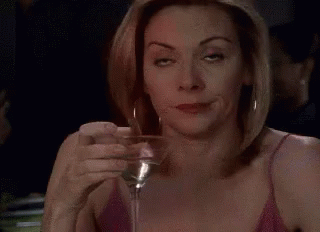  IN CONVERSATIONHow to Celebrate Pride in the Middle of an Anti-trans BacklashPhillip Picardi talks to Raquel Willis NAME A MORE FABULOUS DUO? WE'LL WAIT. (PHOTO BY ASTRID STARWIAZ VIA GETTY IMAGES) I’d love to start this newsletter off with a “Happy Pride!” but, to be honest, it’s hard to feel happy right now. As an out gay man who’s worked in the media for over a decade—I’ve never felt more disheartened by what I’m witnessing in the zeitgeist. I’m not just speaking of the senseless acts of police brutality, gun violence, and judicial overreach we’re witnessing in our country. I’m specifically speaking to the war being waged on the LGBTQ+ community, specifically on queer and transgender youth. Let’s make no mistake about it: We are once again in a dangerous era of American history for LGBTQ+ people. Our nation’s slide toward conservatism is not just nigh—it’s upon us. And newly emboldened, our enemies are betting that the complacency of cisgender, heterosexual people will allow them the opportunity to criminalize and demonize us once more. Many of us are starting to wonder if they’re right. Trans activists have been warning us about this shift for years. One of them is my friend and former colleague, Raquel Willis, a community organizer who’s worked with the Transgender Law Center and formed Black Trans Circles, a healing and leadership-building program specifically for Black trans women in the South. She was also one of the lead organizers of the historic March for Black Trans Lives in 2020. Raquel and I grew close when I was editing Out and she became the publication’s first Black trans woman to hold a position of leadership, as our executive editor. In every editorial meeting, Raquel always asked us: Who’s missing here? Who is not in our pages? She was constantly holding a mirror up to us as journalists, as people, and as a community to take inventory of who we were valuing and who we were leaving out. I was honored to talk to Raquel about what it means to “celebrate” Pride this year, where our movement is heading, and to hear more about her radical vision for gender justice. “Happy” Pride.  THE BLUEPRINT, MARSHA P. JOHNSON (PHOTO BY BARBARA ALPER VIA GETTY IMAGES) Phillip Picardi: How are you feeling about Pride Month this year? Raquel Willis: I always feel conflicted about Pride. For me, it's about acknowledging the queer and trans ancestors who furthered progress for the LGBTQ+ community and who built a foundation for us. [But], these last few years, we've seen the most concerted anti-queer and anti-trans legislation in the history of the United States. Not enough has been done to safeguard the rights and lives of queer and trans youth in particular, and unfortunately, it seems like the movement as a whole is solely on the defensive. Also, all of these attacks—against abortion access, voting rights, gun control—are swirling in the same pot. We've been conditioned as an American society to see these issues as separate, and because of that, we are not only fighting against the GOP, but we’re fighting against each other on the progressive side, just to be heard. PP: It’s interesting how abortion and queer rights have always been linked. I was watching the Gloria Steinem documentary yesterday, and she was talking about the importance of feminists voting to make abortion a part of the women's rights movement. In the same convention, they also voted as to whether or not discrimination against lesbians should be considered a feminist issue [they did so]. It reminds me of today: Some cis women say they should not include trans women as part of the feminist movement, that trans women are somehow infringing upon cis women's rights. RW: We have to contend with the fact that we live in an individualistic, white supremacist, cishetero patriarchal capitalist system. That means that a scarcity complex has been present even within the most leftist, most progressive circles. When you look at the larger movement for feminism, we have seen so many splinters throughout history—Black feminism, lesbian feminism, trans feminism, queer theory, etc.—because those wounds of exclusion have never been adequately addressed. They’ve continued to be weaknesses that conservatives have been able to exploit. When we talk about conservatives, we’re not just [talking about] cis, white, privileged straight men. It is also trans-exclusionary radical feminists (TERFs). PP: We know that conservative organizations are deliberately working to disguise bigotry as common sense talking points—which are then being parroted by people who we consider to be on the left. RW: A lot of what is being parroted by figures like JK Rowling, or Dave Chappelle, or Ricky Gervais, or Bill Maher is a regurgitation of a fascistic, fear-mongering ideology that comes from the GOP. They release it out into the zeitgeist because they can take advantage of confirmation bias—these baseline ignorant ideas that the average person has about queer and trans people or people of color. There has to be a villain. The villain becomes the Other. As a Black trans woman, I'm constantly disgusted by how trans people are discussed, particularly in niche media, like Black media. They know if they put up our image or our experiences without context, the average person within their target demographic is going to feel negatively about us.  YES, PLEASE END GENDER REVEALS. (PHOTO BY MICHAEL M. SANTIAGO VIA GETTY IMAGES) PP: It’s especially disconcerting because people demonize trans people using familiar tropes that revolve around them being an “impostor”, or a ”traitor” to their gender. Similar tropes have commonly been employed to target women and especially Black women. People in the feminist movement were often called “angry lesbians,” or they were assumed to be ugly and sexless. Some Black women in the public eye who do not fit the mold of White Eurocentric beauty standards have been compared to animals. These are all ways to strip people of their personhood, and particularly to strip people of their womanhood. It is frustrating to see how people can't relate these two issues and find solidarity among them. RW: Absolutely. No one should be moving through this world thinking that their lives are not political. Everything about your existence, everything about what you have and don't have, is political. We're all being impacted by these restrictive ideas about what it means to be a man or woman, or nonbinary, or everything and nothing all at once. And the sooner we can grasp that, the sooner we can come up with the solutions to make our families, our communities, and our societies better. PP: You mentioned earlier that a lot of advocates warned that resting our laurels on Roe [to protect abortion access] could be dangerous. You could say the very same thing about the Gay Rights Movement’s very deliberate move to adopt marriage equality and military representation as their pet causes. The driving idea at that time was obviously palatability. We knew that if we could appeal to we're just like you, we're people, love is love, let us serve, let us be patriots like you, that we could win public approval. And ultimately we did. What the movement didn't anticipate was that those rights could be stripped away less than a decade later. RW: When I think about this long arc of the LGBTQ+ movement, there have been those people who thought that if they could just move into cis-hetero society, then all of their issues would be fixed. So when cis gay men and lesbians were thinking about what political power looked like, they wanted to assimilate and be palatable because that was the extent of their imagination. And there were decisions made along the way to exclude trans folks, and gender non-conforming folks, and nonbinary folks. We have to contend with that history and we have to contend with the fact that our infrastructure nationally has been built with that mindset in place. And so that's why our movement has not been ready to react in a moment where conservatives have pinpointed the Achilles heel of our movement: the exclusion of trans and nonbinary folks.  THE LESBIAN AVENGERS, NYC PRIDE PARADE 1995 (PHOTO BY STUART LUTZ VIA GETTY IMAGES) PP: And now that our "wins" are being rolled back, we need to rely on each other more than ever—by banding together as a community that doesn't prioritize the cis-hetero patriarchy. One of the things that I do find to be extremely practical and inspiring about trans liberation is that I, myself, was considered a gender traitor. I was an effeminate young boy who refused to act more masculine, who insisted on wearing pink, and loving the Spice Girls, and wearing makeup, and putting on my mother's clothes. I was policed, and bullied, and called names often by people in my own family. That doesn't make me trans, but it reinforces my belief that trans liberation, had it existed back then, would have laid some sort of blueprint to say: You don't need to conform, you can be exactly who you are, you can be beautiful, and you can be loved. RW: I think you get to an essential element of what ties everyone's experience together. It's not that I believe that everyone is trans. No, honey, I don't think everyone is that gifted, that brilliant, that colorful, and that's okay! But everyone is “gender nonconforming,” and the sooner we realize that, the sooner we can break down all of these expectations that are not only hurting trans and gender-nonconforming folks, and queer folks, and women, but [also] hurting these cishet men who dream of embodying a toxically masculine ideal. PP: A lot of what you're saying reminds me of your speech at the Brooklyn Trans Liberation March in 2020, where you said, "I believe in my power. I believe in your power. I believe in our power. I believe in Black trans power." Can you tell me a little bit about how that worked in your mind and why it's an important rallying cry moving forward? RW: One thing that was always clear to me is that there’s something about queerness that forces you to look at people differently. It forces you to understand that there's this whole interior world that everyone has. Hopefully you get to a point in your journey where there's healing and you understand at least a smidge of your own power. I figured along the way that if I was going to have to have this difficult life that I was told I was going to have by religion and community and society, then I was like, well, let's fuck some shit up along the way. And how do I inspire other people to fuck some shit up along the way? Because if we're going to be damned, honey, then I want to be damned and cute and at least have these little moments of joy that I can grasp at. I think that's where I'm at with movement work and with social justice and with our society. We have so many deep issues within our world that it will probably take centuries to figure out some better way forward for everyone. The best we can do is figure out how to be a part of that fight and also have whole, full, and joyful lives along the way.  FOLLOW THE METEOR Thank you for reading The Meteor! Got this from a friend? Sign up for your own copy, sent Wednesdays and Saturdays. Need to get in touch? Drop a line at [email protected]
|
![]()
Who hurt you GOP? It wasn't trans people
Dear Meteor readers,
Allow me to be the millionth person today to wish you a happy and prosperous Pride via email! We made it to June, the corporate rainbow washing is in full swing, and that humidity in the air is just the unshed tears of all the right-wing homophobes whose screams about the “gay agenda” will be drowned out by hot gurlz on motorcycles popping wheelies over rainbow crosswalks. Don’t you just love this time of year?
In today’s newsletter, we take a moment to reflect on what Jennifer Finney Boylan calls the transgender tripping point and the irony of increased visibility coexisting with the most aggressive attacks we’ve ever seen on trans rights. Hot: Laverne Cox Barbie. NOT: Over 300 pieces of anti-trans legislation in 2022.
Before we get to that, a little bit of news—including the utterly baffling verdict in the Johhny Depp, Amber Heard defamation trial.
Tasting the rainbow,
Shannon Melero

WHAT'S GOING ON
Nobody won: A jury has found Amber Heard liable in the defamation trial brought by her ex-husband Johnny Depp over a 2018 Washington Post op-ed Heard had penned, where she claimed she was a victim of domestic violence but did not name Depp specifically. Yes: He told friends he wanted to “fuck her burnt corpse,” but here we are, with the entire internet erupting with joy and our actual elected representatives posting in Depp’s favor. Depp was also found liable in Heard’s defamation countersuit, although she owes him about seven times more than he owes her. Whatever you think about the case itself, the use of it as a referendum on the credibility of survivors will be far-reaching. As Jaclyn Friedman wrote here on Saturday, “If Depp wins the suit against Heard for saying she was abused—again, without even naming him!—it is going to get a lot easier for abusers everywhere to use the courts to silence the exes they abused, too.” If you or someone you know should need it, the National Sexual Assault Hotline is 1-800-656-4673.
Lone Star lunatic: Picture this, if you can. You are Governor Greg Abbott. You have tirelessly worked to destroy the lives of trans youth, strip Texans of their reproductive rights, and you’ve just witnessed a wholly preventable mass shooting in your state. And then you fix your mouth to say, “We as a state, we as a society need to do a better job with mental health,” and you expect people to believe you really mean that. Just a month ago, this motherfowler diverted $211 million from Texas’ Health and Human Services Commission, which oversees mental health programs in the state, and gave that money to a beefed-up border patrol program called Operation Lone Star. Gaslighting, thy name is Greg! Here are three non-profit organizations providing mental health services in the Uvalde area.
Canada gets it: Prime Minister Justin Trudeau has seen the horror endured by his neighbors to the south and is taking action. On Monday, Trudeau introduced new legislation that would prevent Canadians from “being able to buy, sell, import, or transfer handguns.” This latest move comes two years after Trudeau banned assault-style weapons in his country, a ban that several countries have instituted but that America tried in 1994 for 10 years and then let expire and rot like the ugly apple in an overcrowded Trader Joe’s. The Canadian bill would also immediately revoke firearm licenses from anyone involved in domestic violence cases or criminal harassment (i.e. stalking). Where the bill falls short (in my humble non-Canadian opinion) is that it does not require current handgun owners to surrender their firearms, which at this moment in time feels like a good thing to do. But considering I live in a country that does next to nothing after children are gunned down in school, I guess I’m not really in a position to judge.
AND:
-
A TWENTY THIRD (23rd!!) woman has filed a civil lawsuit against NFL player Deshaun Watson for “inappropriate sexual conduct.” Despite the 22 previous lawsuits, Watson is still employed by the Cleveland Browns and I hope y'all are all ashamed of yourselves.
-
Meteor superstar Samhita spoke to Elizabeth Warren for The Cut about why we have to keep fighting even when it doesn’t feel like we’ll win.
-
Local New York woman Cindy Melero is graduating college after taking a break from higher education to raise her child Shannon Melero, who happens to be typing this sentence. Congrats, mom!
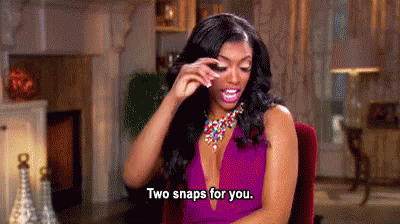

IT WASN'T SUPPOSED TO BE LIKE THIS
The Transgender Tripping Point
Reflections on a decade of wins and losses
BY JENNIFER FINNEY BOYLAN

SHE'S BEAUTY AND SHE'S GRACE (PHOTO BY EMMA MCINTYRE VIA GETTY IMAGES)
There she was, on the cover of Time magazine, fabulous and poised in a creamy blue dress. It was 2014, and Laverne Cox was wearing an expression that said: Our time has come. It was, as the magazine’s headline proclaimed, the “Transgender Tipping Point.”
That was eight years ago—although, in trans years, it may as well have been a lifetime.
In March, as she interviewed Ketanji Brown Jackson for her seat on the Supreme Court, Sen. Marsha Blackburn (R-Tenn) demanded that Justice Jackson define “woman.” The justice refused. “I’m not a biologist,” she replied.
The moment served as a rallying cry for the right, supposedly framing Jackson as a radical. You could imagine conservative heads shaking sadly all across the nation—a nominee for the highest court in the land, unable to describe the most obvious thing in the world!?
As if it were obvious. As if sex and gender are simple as pie; as if these were things that they themselves could easily define if pressed.
How we moved from the great transgender “tipping point” to the “tripping point”—with over 300 laws introduced to restrict our rights this year alone—is the story of how the increased visibility of trans and nonbinary people became the very thing that inspired conservatives to try to erase us.
Transgender people are not new: On a recent visit to the National Archeological Museum in Naples, Italy, I gazed upon an ancient fresco of a hermaphrodite, a portrait unearthed in the ruins of Pompeii. As a trans woman myself, it was hard not to look upon that fresco with a profound sense of joy and recognition. People like me, I thought, have always been here.
In fact, the “tipping point” in my own lifetime was made possible by people fighting for our rights: Sylvia Rivera, Canary Conn, Kate Bornstein, Jan Morris, Jamison Green, Bamby Salcedo. Each of them, in living their lives in public without shame, has helped light the path for the next generation.
But 2014 felt different. Laverne Cox starred in “Orange Is the New Black.” That same year, Janet Mock published Redefining Realness, a book that became an instant classic. Amazon Studios launched the series “Transparent,” a show that depicted the ripple effects upon the Pfefferman family when the family patriarch (sic) comes out as trans. (I served as a consultant to that series in the early stages of its development).
There had been visibility before, of course. But this was something else—trans people telling their stories on their own terms with complexity and nuance. Surely, I remember thinking, this gave us hope for greater acceptance and understanding?
But with increased visibility came new dangers. When I transitioned, back at the turn of the century, a lot of people didn’t know they were supposed to hate me; most of the people I knew couldn’t have told me the difference between a transsexual and the trans-Siberian railroad. In the absence of a movement of orchestrated pushback, I found myself greeted mostly with acceptance and love, even if that love did not necessarily come with a full understanding of my experience.
I don’t really get this, a colleague wrote to me, back then. But you’ve always been my friend. My mother, the evangelical Republican, put her arms around me and suggested I write a book. “You could open a lot of hearts,” she said.
That was then.
Now, when I publish pieces about trans lives, I inevitably receive hostile, accusatory rejoinders: What about that trans person on the Yale swim team? Why are five-year-olds getting to choose their gender? What about the way trans women “erase” cis women? What about this word “cis” itself? Whose idea was that, and why is my kid being forced to say it?

THE KIDS GET IT. (PHOTO VIA GETTY IMAGES)
None of these are easy questions, although I’m glad to have a thoughtful, nuanced conversation about each of them in turn, should you wish. But we’re not really doing thoughtful and nuanced these days.
Let’s be clear, I’m not arguing against visibility. I agree with Audre Lorde: “Visibility which makes us most vulnerable,” she said, “is that which also is the source of our greatest strength.”
That strength is needed now more than ever. Now that they know we exist, states with conservative legislatures are passing bills making it a criminal act to provide health care to trans kids, making it impossible for trans kids to play sports, and making our lives as miserable as can be. Last month, in Alabama, Gov. Kay Ivey signed a bill forcing trans youth to detransition, and every day a new bill is proposed.
If there’s a bright side to this moment—and believe me, I have to look pretty hard to find one—it’s that Republicans are realizing they themselves can’t define what it means to be a “man” or a “woman.” Sen. Josh Hawley (R-Mo.) said it’s “someone who can give birth to a child, a mother, is a woman. Someone who has a uterus is a woman. It doesn’t seem that complicated to me.”
When he was asked if someone who has had a hysterectomy is still a woman, his face clouded, as if suddenly it occurred to him that something he thought was “not that complicated” was, indeed, a question much harder than he had imagined.
“Yeah well, I don’t know,” he said, uncertainly. “Would they?”
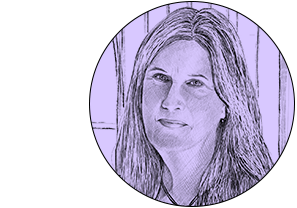
Jennifer Finney Boylan is the Anna Quindlen Writer in Residence and Professor of English at Barnard College. She is a Trustee of PEN America and a Contributing Opinion Writer for The New York Times.
We just hate believing women
|
No images? Click here Dear Meteor readers, “Our bodies are not designed to absorb and process this much violence, loss, and grief,” Min Jin Lee tweeted on Wednesday after this week’s massacre in Uvalde, Texas. I have not been able to get these words out of my head as I’ve tried to move on this week—as I’m sure you have, too—heartbroken, haunted by the beautiful children’s faces, sitting with their parent’s grief, and unable to shake the horrid details that continue to emerge, and enraged that on the heels of the tragedy, the NRA went ahead with its convention (despite some Republicans and several country musicians pulling out). The mourning, grief, and anger cycle is on repeat. If you missed it, do check out our list of ways to break the pattern of inaction. Meanwhile, the Amber Heard/Johnny Depp defamation trial, which has been simmering in the background for the last two weeks, is entering its final days as the jury is now deliberating. Avoiding this event has been damn near impossible—prior to this week, the trial had been the most talked-about story this spring across social platforms: more than abortion, Ukraine, and even COVID. While I’ve watched the bafflingly un-nuanced reaction unfold, there’s one person I’ve really been wanting to hear from—my friend Jaclyn Friedman. Jaclyn is a writer, activist, and sex educator who has been working on survivor justice for a long time. She is the co-editor of two important anthologies about rape culture, including Yes Means Yes: Visions of Sexual Power and a World Without Rape, and wrote two books on consent, power, and sex. TL;DR—she knows her shit! Jaclyn says she knows exactly why we mistrust Amber Heard, and she’s written a searing essay about that and what it costs victims of intimate partner violence. But first, the news. Holding a fire extinguisher, Samhita Mukhopadhyay  WHAT'S GOING ON90 minutes: In many communities there is a saying: order a pizza and call the cops, see who comes first—the unspoken wisdom being that the police force in some neighborhoods (predominantly those of color) are in no rush to protect and serve. As more details about the police response to the Uvalde shooting emerge, it is shocking to learn the timeline laid out by Texas safety officials. What is most unsettling is that first responders didn't immediately breach the school, after the shooter had gone inside. In fact, it would be another hour before a tactical team got close to the classroom where he had barricaded himself along with his victims. During that time—while parents were begging for help, for anyone, to save their children—officers “took cover” outside and waited for more backup so as not to risk being gunned down by a semi-automatic weapon. So answer me this: If even the “good guys with guns” are ineffective against an AR-15, how have we not banned the legal sale of that weapon? *Stares at every member of Congress* The heat is on: Our leaders have been rightfully and urgently called to the mat for inaction on gun control. (Reportedly, a small group of Senators is trying to find common ground on gun legislation, including red-flag laws or expanding background checks) You know what’s making me skeptical? That Democratic leadership backed a pro-gun, anti-choice Democrat (Rep. Henry Cuellar) over a pro-choice young woman of color ready to back sensible gun legislation (Jessica Cisneros) in the District 28 race in Texas. The runoff was held the same day as the massacre in Uvalde, and as of Friday Cisneros was trailing by only 177 votes. As Rebecca Traister pointed out, this might be why we need new leadership. Getting away with it: The FBI agents who fumbled the Larry Nassar investigations will not be facing criminal charges from the Department of Justice. Now mind you, in July of last year, the DOJ found “gross failures” on the part of the FBI agents who first received complaints from gymnasts in 2015. The two agents responsible for this absolute clown show, Michael Langeman and W. Jay Abbott, have been met with little more than a slap on the wrist: Langeman was fired from his position after the DOJ released its findings and Abbott retired. Must be real fuckin’ nice to retire in peace while more than 200 women deal with the trauma of being abused by Larry Nassar. Come on Barbie, let’s go party: Serious Feminists™ have made much ado about Barbie dolls and their representation of regressive feminity. But for this brief moment in time, the doll is doing some good. On Friday, toy company Mattel released a new Collector’s Edition Barbie created in the likeness of Laverne Cox. While the doll is not an exact replica of the iconic Cox, this is the first ever Barbie modeled after a transgender person and its release is a big fabulous middle finger to the more than 200 anti-trans state bills filed this year. *Adds to cart* AND:
 INTIMATE PARTNER VIOLENCEWhy Everyone Online is Having Such a Ball Trashing Amber HeardIt's not a mystery—but it has real consequences, for survivors and all of usBY JACLYN FRIEDMAN  AMBER HEARD LEAVING THE COURTHOUSE, WHERE HER TESTIMONY WOULD SOON BE DUETED BY A BUNCH OF TIKTOKERS. (PHOTO BY CLIFF OWEN VIA GETTY IMAGES) If you’ve been off-planet for the last month, lucky you! You may have missed the fact that Johnny Depp is currently suing his ex-wife, Amber Heard, for defamation, based on a 2018 op-ed she wrote in which she identified herself as a “public figure representing domestic abuse,” but did not mention him by name. Heard is countersuing. The trial has made constant international headlines for the bizarre and shocking things that have been testified to under oath about both Depp and Heard. And it has unleashed a truly unprecedented torrent of pro-Depp shrieking in nearly every corner of Al Gore’s internet. Some of it has not been exactly organic. Last Thursday, Vice broke the news that the Daily Wire (Ben Shapiro’s personal megaphone and the most likely publisher of whatever your racist aunt shared on Facebook today) has reportedly spent tens of thousands of dollars promoting biased and misleading pro-Johnny Depp content on social media. I wish I could say I was surprised, but honestly, the bear hug that “Hollywood elite” Johnny Depp is getting from “men’s rights activists” and white supremacists is the least shocking development since the hilarious failure of Truth Social. Of course, they love him: he validates their entire worldview, which is that they are the real victims of feminism run amok and that saying otherwise is not just misguided but abusive. Of course, the right is invested in trivializing assault; there are enough 2022 GOP candidates facing allegations of sexual assault and/or domestic violence to warrant a New York Times trend piece. So of course conservatives are forking over loads of cash to flood the zone with pro-Depp propaganda. But what feels genuinely shocking to me this time around is how many folks who should really know better are falling hard for it. Yes, yes, Johnny Depp used to be dreamy. Trust me, I know. I was 15 when he broke through (my loins) as a face-meltingly hot damaged bad-boy cop on “21 Jump Street,” and 19 when “Edward Scissorhands” branded me with false (sexy) impressions about weirdo emo outsider men that I still haven’t been able to shake. Don’t bother me about Captain Jack Sparrow, that shit is like stevia compared to the pure cane sugar of early Johnny Depp hotness.  THERE'S NO WAY THIS BABY HAS SEEN A JOHNNY DEPP FILM AND CONSENTED TO JOIN HIS "TEAM." (PHOTO BY SARAH SILBIGER VIA GETTY IMAGES) But this jubilant defense of Depp goes beyond the derangement of parasocial adoration. And while I’ve seen some thoughtful stories about Heard as an “imperfect victim,” I don’t think the reaction is just about the “complicated” details of the case, either. If the common wisdom—that Depp was a victim of Heard’s alleged abuses too—was sincere, the cultural conversation would be solemn. Instead, the reaction has been ecstatic and deranged—we are getting cat memes and Lance Bass on TikTok. Even Kate McKinnon gleefully treated the trial like a joke. Now, remember: Amber Heard has testified that Johnny Depp hit her so hard that blood from her lip ended up on the wall, pulled her hair out of her scalp in chunks, and made her fear for her life on more than one occasion, among many other allegations found credible by a British judge in a separate case (where it is harder to prove such things than even in the U.S.). Depp testified that Heard struck him, threw things at him, and mocked him for objecting. So why is everyone having such a good time joking about domestic violence? The reason is simple but awful: we, as a culture, hate believing women. I don’t just mean we find it hard to believe women. I mean we hate it. Studies have shown that we like women less when we actually have to listen to them. It is psychologically painful for most of us to believe women, even when we are women. So after years of at least sort of holding the line on #metoo, what a giddy relief so many seem to be feeling to not have to right now.  OKAY, BUT WHY? (PHOTO BY SARAH SILBIGER VIA GETTY IMAGES) The facts of this case are just easy enough to manipulate to give anyone who wants it permission to stop doing the painful work of treating women as credible witnesses to their own abuse—work that anti-violence advocates have, in recent years, succeeded in convincing more people to undertake. Evidently, putting that burden down feels, to far too many of those people, like taking off an ill-fitting bra at the end of a long day. Let me be clear: People of all genders can be abused, and people of all genders can be abusers. And most cases of intimate partner violence are hard to parse from the outside because it’s very common for victims to act in all kinds of ways that don’t seem like how we think victims “should” act. Abusers exploit this very fact in courts every single day. We just don’t usually get to watch it on live television. (If you’re having trouble sorting through what you’ve heard about this case, here are a few pieces I highly recommend.) But whatever you personally believe, the way so many people have turned blaming Amber Heard into a bloodsport is already taking an awful toll on nearly every survivor I know—including myself. It’s hard to explain the hollow, falling feeling I get in the pit of my stomach each time I see someone I thought I could trust join in on the “fun,” somehow not considering (or caring?) that they might as well be laughing at one of the worst things anyone has ever done to me. And the impacts on survivors only get worse from here. If Depp wins the suit against Heard for saying she was abused—again, without even naming him!—it is going to get a lot easier for abusers everywhere to use the courts to silence the exes they abused, too. Whatever the jury decides, the euphorically vicious discourse has already sent a message to abuse survivors everywhere: if you dare speak up, you will be mocked and attacked from all sides. It’s no wonder that survivors are already considering backing away from their own cases, or that Depp fans are now turning on other survivors, as well as on Depp’s own daughter for not supporting him more publicly.
When I was in my 20s, my girlfriend Leslie had a therapist who explained the four steps of consciousness in the process of changing our behaviors and beliefs. You start out in unconscious incompetence, unaware of the things you’re doing or thinking that are harmful to you or others. Then, if you try, you move into conscious incompetence. This is the worst of all the phases: you’re aware of how you’re messing up, but you still somehow can’t stop doing it. If you keep at it from there, you can intermittently achieve conscious competence, where if you focus really hard, you can do something different and better. And if you keep at it long enough, you can sometimes get all the way to the ultimate goal: unconscious competence.  500 MILES? HAVE YOU SEEN THE PRICE OF GAS? THIS IS FISCALLY IRRESPONSIBLE! (PHOTO BY RON SACHS VIA GETTY IMAGES) The reason it’s so hard for humans to change, even when we know we should, is because those two middle phases—conscious incompetence and conscious competence—take so bloody long, require so much work, and are painfully uncomfortable. Trying to change is the worst. That’s why we tend to hate women who force us to make the attempt. I believe Amber Heard. I can’t make you believe her if you don’t. But for fuck’s sake, this case isn’t some metaphorical trip to Vegas where everything you do and say about this trial will stay there. It has already made the world a much scarier place for people who’ve been targeted by abusers, and a much friendlier place for abusive assholes who are right now selecting their next victims. Survivors don’t ever get a vacation from our trauma. So you don’t get a vacation from trying to teach yourself to care.  PHOTO BY GENE REED Jaclyn Friedman is a writer, educator, activist, and the founder and Executive Director of EducateUS: SIECUS In Action, a brand-new advocacy organization working to build a national movement of sex-ed voters. She is the creator of four books, including her latest, Believe Me: How Trusting Women Can Change the World.  WE ASKED YOU ANSWEREDLast Saturday, Megan Reynolds wrote about the importance of unplugging—and we asked how you get that impossible task done. Thanks to readers Elaine, Cynthia, Katherine, Lauren, and Ruben for sharing their thoughts, and a special shout-out to Anna C. (who’s been at a breaking point since 2020; same) for her unplugging tactic: “focus on what’s in my control.” I’m starting by focusing on how I can work to eliminate gun violence in my own state. Thanks for the tips, y’all, Shannon  FOLLOW THE METEOR Thank you for reading The Meteor! Got this from a friend? Sign up for your own copy, sent Wednesdays and Saturdays.
|
![]()
Why Everyone Online is Having Such a Ball Trashing Amber Heard
BY JACLYN FRIEDMAN
If you’ve been off-planet for the last month, lucky you! You may have missed the fact that Johnny Depp is currently suing his ex-wife, Amber Heard, for defamation, based on a 2018 op-ed she wrote in which she identified herself as a “public figure representing domestic abuse,” but did not mention him by name. Heard is countersuing. The trial has made constant international headlines for the bizarre and shocking things that have been testified to under oath about both Depp and Heard. And it has unleashed a truly unprecedented torrent of pro-Depp shrieking in nearly every corner of Al Gore’s internet.
Some of it has not been exactly organic. Last Thursday, Vice broke the news that the Daily Wire (Ben Shapiro’s personal megaphone and the most likely publisher of whatever your racist aunt shared on Facebook today) has reportedly spent tens of thousands of dollars promoting biased and misleading pro-Johnny Depp content on social media. I wish I could say I was surprised, but honestly, the bear hug that “Hollywood elite” Johnny Depp is getting from “men’s rights activists” and white supremacists is the least shocking development since the hilarious failure of Truth Social.
Of course, they love him: he validates their entire worldview, which is that they are the real victims of feminism run amok and that saying otherwise is not just misguided but abusive. Of course, the right is invested in trivializing assault; there are enough 2022 GOP candidates facing allegations of sexual assault and/or domestic violence to warrant a New York Times trend piece. So of course conservatives are forking over loads of cash to flood the zone with pro-Depp propaganda.
But what feels genuinely shocking to me this time around is how many folks who should really know better are falling hard for it.
Yes, yes, Johnny Depp used to be dreamy. Trust me, I know. I was 15 when he broke through (my loins) as a face-meltingly hot damaged bad-boy cop on “21 Jump Street,” and 19 when “Edward Scissorhands” branded me with false (sexy) impressions about weirdo emo outsider men that I still haven’t been able to shake. Don’t bother me about Captain Jack Sparrow, that shit is like stevia compared to the pure cane sugar of early Johnny Depp hotness.
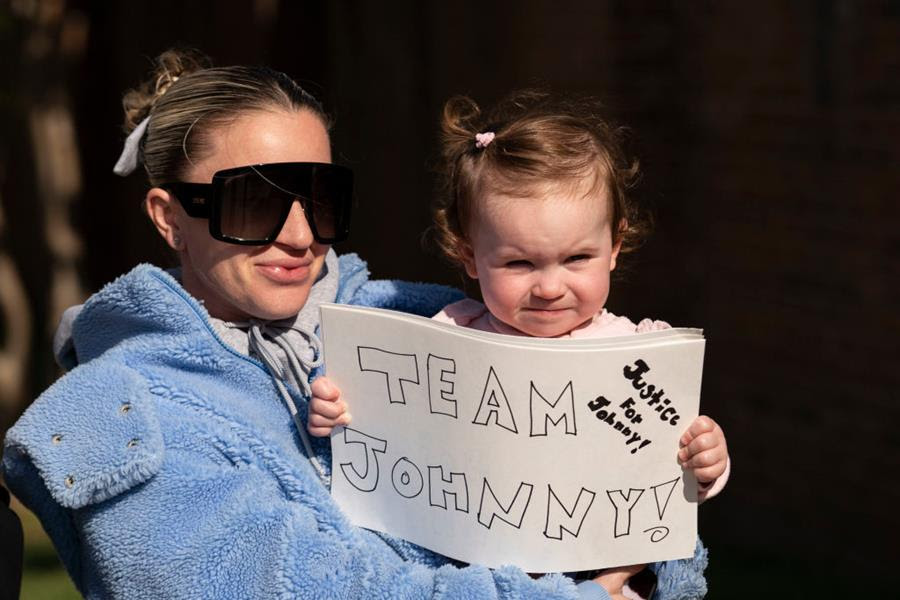
But this jubilant defense of Depp goes beyond the derangement of parasocial adoration. And while I’ve seen some thoughtful stories about Heard as an “imperfect victim,” I don’t think the reaction is just about the “complicated” details of the case, either. If the common wisdom—that Depp was a victim of Heard’s alleged abuses too—was sincere, the cultural conversation would be solemn. Instead, the reaction has been ecstatic and deranged—we are getting cat memes and Lance Bass on TikTok. Even Kate McKinnon gleefully treated the trial like a joke.
Now, remember: Amber Heard has testified that Johnny Depp hit her so hard that blood from her lip ended up on the wall, pulled her hair out of her scalp in chunks, and made her fear for her life on more than one occasion, among many other allegations found credible by a British judge in a separate case (where it is harder to prove such things than even in the U.S.). Depp testified that Heard struck him, threw things at him, and mocked him for objecting. So why is everyone having such a good time joking about domestic violence?
The reason is simple but awful: we, as a culture, hate believing women. I don’t just mean we find it hard to believe women. I mean we hate it. Studies have shown that we like women less when we actually have to listen to them. It is psychologically painful for most of us to believe women, even when we are women. So after years of at least sort of holding the line on #metoo, what a giddy relief so many seem to be feeling to not have to right now.
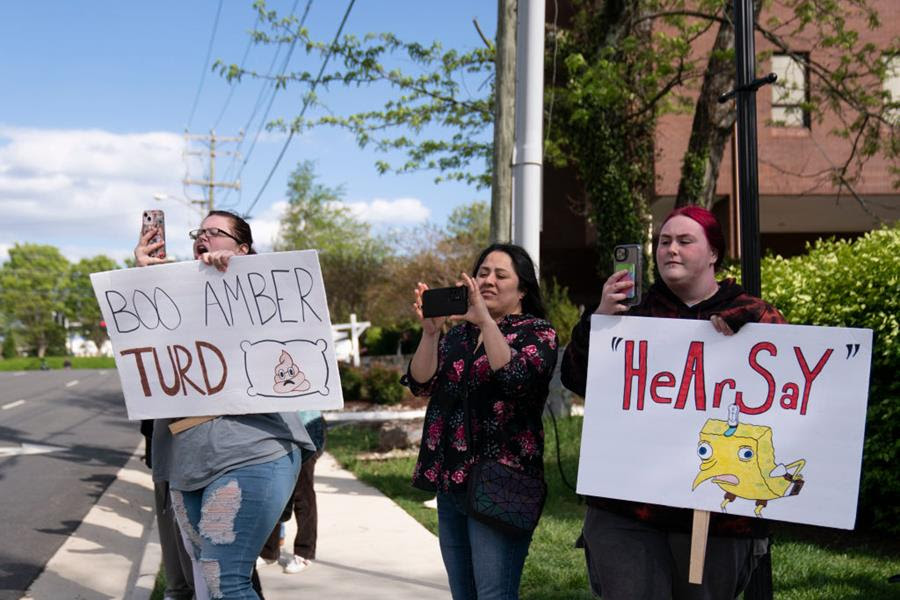
The facts of this case are just easy enough to manipulate to give anyone who wants it permission to stop doing the painful work of treating women as credible witnesses to their own abuse—work that anti-violence advocates have, in recent years, succeeded in convincing more people to undertake. Evidently, putting that burden down feels, to far too many of those people, like taking off an ill-fitting bra at the end of a long day.
Let me be clear: People of all genders can be abused, and people of all genders can be abusers. And most cases of intimate partner violence are hard to parse from the outside because it’s very common for victims to act in all kinds of ways that don’t seem like how we think victims “should” act. Abusers exploit this very fact in courts every single day. We just don’t usually get to watch it on live television. (If you’re having trouble sorting through what you’ve heard about this case, here are a few pieces I highly recommend.)
But whatever you personally believe, the way so many people have turned blaming Amber Heard into a bloodsport is already taking an awful toll on nearly every survivor I know—including myself. It’s hard to explain the hollow, falling feeling I get in the pit of my stomach each time I see someone I thought I could trust join in on the “fun,” somehow not considering (or caring?) that they might as well be laughing at one of the worst things anyone has ever done to me.
And the impacts on survivors only get worse from here. If Depp wins the suit against Heard for saying she was abused—again, without even naming him!—it is going to get a lot easier for abusers everywhere to use the courts to silence the exes they abused, too. Whatever the jury decides, the euphorically vicious discourse has already sent a message to abuse survivors everywhere: if you dare speak up, you will be mocked and attacked from all sides. It’s no wonder that survivors are already considering backing away from their own cases, or that Depp fans are now turning on other survivors, as well as on Depp’s own daughter for not supporting him more publicly.
The impact of this misogynist Rumspringa will be felt by victims for a long time to come.
When I was in my 20s, my girlfriend Leslie had a therapist who explained the four steps of consciousness in the process of changing our behaviors and beliefs. You start out in unconscious incompetence, unaware of the things you’re doing or thinking that are harmful to you or others. Then, if you try, you move into conscious incompetence. This is the worst of all the phases: you’re aware of how you’re messing up, but you still somehow can’t stop doing it. If you keep at it from there, you can intermittently achieve conscious competence, where if you focus really hard, you can do something different and better. And if you keep at it long enough, you can sometimes get all the way to the ultimate goal: unconscious competence.
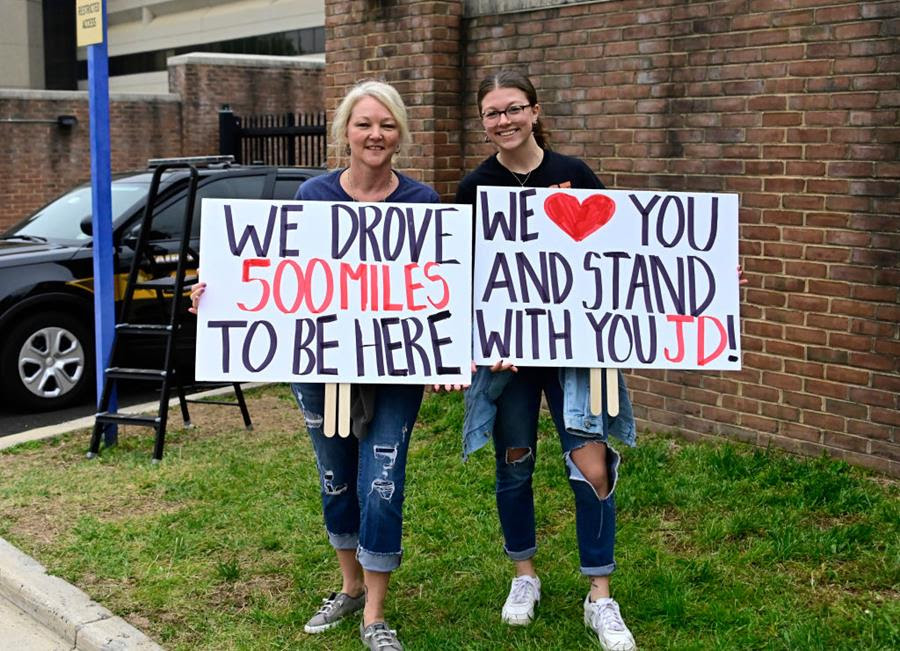
The reason it’s so hard for humans to change, even when we know we should, is because those two middle phases—conscious incompetence and conscious competence—take so bloody long, require so much work, and are painfully uncomfortable. Trying to change is the worst. That’s why we tend to hate women who force us to make the attempt.
I believe Amber Heard. I can’t make you believe her if you don’t. But for fuck’s sake, this case isn’t some metaphorical trip to Vegas where everything you do and say about this trial will stay there. It has already made the world a much scarier place for people who’ve been targeted by abusers, and a much friendlier place for abusive assholes who are right now selecting their next victims. Survivors don’t ever get a vacation from our trauma. So you don’t get a vacation from trying to teach yourself to care.

Jaclyn Friedman is a writer, educator, activist, and the founder and Executive Director of EducateUS: SIECUS In Action, a brand-new advocacy organization working to build a national movement of sex-ed voters. She is the creator of four books, including her latest, Believe Me: How Trusting Women Can Change the World. (Photo by Gene Reed)
Not ending gun violence is a choice
|
No images? Click here  May 26, 2022 Dear Meteor readers, On Tuesday morning, 19 elementary school students in Uvalde, Texas, got ready for school. They threw their homework into their backpacks, finished their breakfast, tied their shoes, and ran out the door. Those nineteen children with entire lives ahead of them—two days before the end of the school year and the joy of summer break—never returned home. They, along with two of their teachers, were gunned down by weapons so powerful that the bodies of the victims were unrecognizable. They were targeted, hunted, and brutally killed by an 18-year-old who had legally purchased two assault rifles on his birthday. The tragedy is unspeakable—but it is no longer unimaginable. It is now a well-worn, inevitable cycle—a mass shooting, lives shattered, outcry, grief, and…no substantial change. The headlines end up on the lower half of the paper; the questions to politicians stop, and the trauma gets ingrained. As a father of a Parkland victim told Anderson Cooper on CNN Tuesday night, “it’s what I call a ‘new normal’.” The idea of a father who has lost a child to gun violence having to acknowledge that this horror now seems “normal” made us sick to our stomachs. But he is, after all, right: This is not the first time we’ve been here, nor will it be the last. This is the third mass shooting in a week; there have been 212 in the United States alone this year and 27 of them have been in schools. Every shooting, we are told, is the “tipping point” that will change the will of politicians on guns. But Congress has yet to pass any meaningful gun control legislation for 28 years, since the assault-weapons ban of 1994. After Sandy Hook, another supposed tipping point, the Republican-controlled Senate thwarted every effort to pass a sensible gun law—including enhanced background checks, something 90% of Americans support. We’ve been worn down by years of inaction. It makes sense to feel hopeless. MASS SHOOTINGS HAVE HAPPENED IN NEARLY EVERY STATE IN THE U.S. AND POLITICIANS ARE STILL DRAGGING THEIR FEET OVER REFORM. (IMAGE VIA EVERYTOWN FOR GUN SAFETY) But it’s also exactly what opponents of gun reform want us to feel. As Molly Jong-Fast put it on Twitter, we need to take bold action now; if we do not, the Republicans will do what they always do–“memory-hole” this tragedy and use talking points and legal grandstanding to erase the fact that what we’re talking about is the bloody massacre of innocent children. But if you are looking for immediate and decisive action—you’d be hard-pressed to find it from Democrats right now, either. “When in God’s name will we stand up to the gun lobby?” Biden asked in his address to the nation. “What are we doing?” cried Senator Chris Murphy on the Senate floor (great speech...but who is we). “Americans can cast their vote in November,” Senator Chuck Schumer said when asked if Tuesday’s tragedy would precipitate an immediate gun bill that could save lives. Should they not have the answers? Isn’t that the reason we all got out the vote in the last umpteen elections? Should they not have the plan? And why did Democratic party leadership endorse incumbent anti-abortion Rep. Henry Cuellar (who has an A rating from the NRA) over pro-gun control and pro-choice candidate Jessica Cisneros in none other than Texas? Make it make sense. WE KNOW YOU'RE SICK OF HEARING IT BUT ELECTIONS ARE CRITICAL!! (IMAGE VIA VOTO LATINO) The bottom line is this: We could dramatically reduce gun violence now, and not doing so is a deliberate choice. As Chris Hayes pointed out: Many of the issues that plague the United States are complicated—they are rooted in histories of oppression, of colonization. But not guns. Gun violence, at the rate that it occurs in the United States, is uniquely American and is directly connected to how many guns civilians can and already have access to. If you make guns less accessible, gun violence drops. No other country's leadership sits by idly while their children are slaughtered at school. But we can do something—donate, call your legislator, share resources, march. We’ve put together a list below of actions you can take today. It won’t bring those children back. Won’t help the parents who waited last night at the Uvalde civic center to confirm if their child was dead or alive. But it’s our only option. As our colleague Brittany Packnett Cunningham says on today's UNDISTRACTED, “I don't know what it's going to take. But I can't live like this. My son can't live like this. None of us should have to live like this.” Y por nuestros gentes Latines, estamos unidos en nuestro dolor. No se importa si somos Mexicanos, Borinquen, Dominicanos, Sudamericanos—en este momento somos una sola comunidad fuertisomo. Sobreviviremos. Pa’lante. Siempre, pa’lante. In love and solidarity, Samhita and Shannon  WHAT YOU CAN DO RIGHT NOWIf you’re someone who believes in thoughts, prayers, full moon rituals, or faith in a higher power, please do all of those things and call on all the gods and ancestors. But as many prophets have taught, faith without works is dead. Here are some small works that can make a difference: TO HELP THE FAMILIES IN UVALDE
TO HELP KIDS ACROSS THE U.S. COPE WITH THIS AND FUTURE DISASTERS
TO HELP END GUN VIOLENCE
 FOLLOW THE METEOR Thank you for reading The Meteor! Got this from a friend? Sign up for your own copy, sent Wednesdays and Saturdays.
|
![]()
The key to *actually* unplugging
|
No images? Click here Dear Meteor readers, I hope you are enjoying your weekend. I’m currently on my way to upstate New York: and my sunscreen is on but my phone is, shockingly, off. I like to unplug on the weekends—stay off social media, disable my alerts, and do something with my hands. (Have you even lived if you haven’t taken a Saturday afternoon nap atop unwanted tote bags you found while organizing a closet?) Why am I sharing so much? Because news fatigue is real—and it took me years to figure that out. It’s been a tough week news-wise—we know that—and so for today writer Megan Reynolds gives us some reflections on what it looks like to disengage from the news cycle even when the world is on fire. But first, a little bit of news—to read at your convenience, and only when you’re ready. From the woods, Samhita Mukhopadhyay  WHAT'S GOING ONIt’s not okay in OK: Legislators in Oklahoma have passed *the* strictest anti-abortion bill in the country—banning abortion at “fertilization.” The bill also would allow citizens to sue abortion providers and anyone else they suspect has knowingly “aided or abetted” in abortion care. Gov. Kevin Stitt—who literally vowed to make Oklahoma the most anti-abortion state in the country—will likely sign this bill, meaning it will go into effect ASAP. Retire, bitch. The rest of us can donate to the Oklahoma Roe Fund here. Feeding babies is apparently controversial: The House passed two bills earlier this week to help support families during the terrifying shortage of baby formula across the United States. One of the bills allows families to use money from a federal program to purchase formula. The other, apparently more controversial, bill would give 28 million dollars to the FDA to prevent this clusterfuck from happening again. Sounds great, right? Too bad 192 Republicans voted against it! I can’t think of a less controversial issue than babies need food and we should feed them, but ok. Here are some resources if you are trying to find formula or support a family that is. AND:
 PERMISSION TO UNPLUGThere's a Better Way to Manage the Unrelenting News CycleMaybe you feel guilty tuning out, but a little breather could make all the difference.BY MEGAN REYNOLDS  ORIGINAL ILLUSTRATION BY UZO NGWU Every morning for the past four and a half years, I would wake up, make coffee, and settle in for a day of imbibing the trials and tribulations of the world at large, via Twitter, an overflowing RSS reader, and the Slack channel of the feminist website where I worked. The purview of the website was large—covering everything from the Republican war on abortion to Bennifer 2.0—which meant that the possibilities for content were endless. I was dialed in and it was impossible to separate my leisure time from my work time. (RIP to the late-night Slack messages I sent to myself full of stray links, TikToks, tweets, and other digital ephemera, accompanied by hastily-written notes that, when viewed in the light of day, made little to no sense.) I was living the dream, especially for a writer–I could cover whatever I wanted, as long as it was in the news and I had something to say about it. With each passing catastrophe, the pressure to say something of note about current events became too much. Working in digital media straight through the pandemic planted the seeds for what I now understand to be burnout. As we all retreated to our homes, my coworkers and I were still tethered to work and each other through our shared Slack. There was a comfort in knowing that we were going through this together. Being plugged into the news cycle and producing work felt like the only way to manage the uncertainty of the world at large. And there was a certain pride attached to it—that even in the face of an unprecedented global health emergency and a massive shift in perspective, I was able to produce something that was informing people and possibly helping them in their time of need. But I was exhausted, cranky, and clenched my jaw so much that sometimes, I bit down on a Popsicle so that I wouldn’t grind my teeth. Occasionally, I burst into tears over the smallest of slights. When I left my job as a writer at the end of 2021, I immediately detached from the news cycle. In a way, I buried my head in the sand out of necessity, in part for my own survival. Suddenly, I was afforded the privilege of simply having an opinion and keeping it to myself. For a period of time, I stopped reading each individual morsel of news that crossed my path, be it in a text message or on Twitter or Facebook, and chose to use the internet for activities I’d previously abandoned, like online shopping and watching hours of beauty tutorials on YouTube. Playing dumb in this way felt unusual at first. But I realized I had managed to fully disconnect when a friend texted me about Will Smith slapping Chris Rock at the Oscars (I’d stopped watching the telecast before it happened.) That this friend came to me with this news instead of the other way around meant that I’d almost gotten free. “I can’t believe I knew this before you,” my friend told me. Neither could I, but it felt great. And it felt freeing. Watching television or reading a book, two activities that had become work, also, became leisure activities once more. But unplugging myself from that particular matrix was difficult, because a small part of me enjoyed the hustle and the bustle, as damaging as it was to my mental health. I was essentially trauma-bonded to the colleagues I’d worked with, and they were now my friends. For a few weeks after I left that job, my brain still churned with ideas and stray thoughts that could’ve been essays; instead of turning these into something bigger, I simply texted my friends, relishing in what I believe normal people call “conversation.” I’m not saying that ignoring the atrocities that have become our new normal is a solution, in fact, it’s impossible to ignore these things because they take such a toll on our lives. But there is deep value in taking a moment between crises to breathe. An act as small as condensing the constant barrage of notifications from various news sources into an easily-digestible summary that is now delivered to my phone once a day, drastically lowered my stress levels and still allowed me to be informed rather than overloaded with information. I have learned that this is what a boundary feels like: the invisible line that exists between my feelings and something else, a line that exists to protect me from harm. Erecting that boundary has made it easier to engage with the news now, especially given the current moment. And while setting boundaries for what I consume sounds simplistic, it is an incredibly difficult thing to do in the midst of my reproductive rights and my very identity coming under constant fire. For some disengaging is merely a privilege, but for others, it can be the only way to get through a day. Or even save us from utterly losing hope. Now that I no longer feel the need to respond publicly to everything that happens in the world, I can actually digest what is happening, and direct my energy toward the causes, issues, and concerns that matter. But it was only after I allowed myself to take that space that I felt I had the energy and the brainpower to really, deeply care again.  Megan Reynolds is a writer and editor in New York whose work has appeared in the New York Times, Jezebel, and more.  TELL US HOW YOU UNPLUGDisengaging from the news can be difficult. I, for one, have logged an embarrassing amount of hours on my phone this last week googling, “what is the difference between colonization and free association.” How do I disconnect? I rollerskate at a local park. It’s really hard to think about anything else when you’re rolling down a hill at 20 MPH. We’d love to know how you find a slice of peace during These Times™. Click the button below to share your tips with us and we’ll feature some of your responses in our next newsletter! xoxo, Shannon Melero  FOLLOW THE METEOR Thank you for reading The Meteor! Got this from a friend? Sign up for your own copy, sent Wednesdays and Saturdays.
|
![]()
Could the ERA get us out of the abortion rights disaster?
|
No images? Click here Dear Meteor readers, How many times are we going to write to you with, “It’s been a tough week,” or “We’re totally out of words,” or “What else is there left to say?” But here we are, again. We’re in the unfortunate business of expressing ourselves with words, and yet we have run out of them. When the news hit over the weekend that an armed gunman had walked into a grocery store in Buffalo, NY, and opened fire on the patrons, shooting 13 of them and killing 10, I’m sure, you, like us, were wordless too. What is there to say when you hear that Andre Mackniel was shot dead while picking up a birthday cake for his young son? Or that long-time community activist 72-year-old Katherine Massey—who had written an editorial just last year urging more federal firearms legislation—was among the victims? And before we could even process it—there was another shooting. And then another. Since the start of this year, there have been 200 mass shootings. Disgust. Anger. Despair. Fear. These were all the feelings—especially after it was reported that the Buffalo shooter had written a manifesto and had intentionally targeted Black people. White supremacy—not just hatred, but an organized strategy, rooted in the myth of the Great Replacement Theory—is revealed over and over again. We are so far from a solution to gun violence and to a solution to white supremacy. But as Meteor founding member Treasure Brooks put it in her beautiful monologue, “it ain't going to go away unless we make it go away.” Now back to that other ongoing disaster, in today’s newsletter, Sarah Leonard, writer and founder of Marxist feminist publication Lux, considers another possible strategy in the fight to defend our abortion rights. But first, some news. Trying to keep it together, Samhita and Shannon  WHAT'S GOING ON#WeAreBG: WNBA star Britney Griner has been wrongfully detained in Russia since February—for allegedly possessing hashish oil. The consensus among sportswriters and athletes has been to not make much noise about the arrest in the United States in the hopes that silence would somehow keep her safe. The choice to remain silent was also an economic one, many WNBA players travel overseas during their off-season to make additional money. Speaking out against BG’s detainment could put their second jobs on the line and even WNBA leadership encouraged discretion. But now it’s been months—and keeping quiet hasn’t done jack. On Tuesday, NBA Commissioner Adam Silver explained that his league is now working in concert with the WNBA to bring BG home. Silver told ESPN. “Our No. 1 priority is her health and safety and making sure that she gets out of Russia.” Say it louder. USWNT: Hey! It’s something good! The U.S. Women’s National Team has achieved equal pay for the first time in its history. Earlier this year, players came to a settlement with their employers over a longstanding pay discrimination suit; that was a victory but didn’t quite make it to the back of the net if you will. The money promised to the players in the settlement earlier this spring was contingent on the ratification of a new collective bargaining agreement that would provide a structure for equal pay and equal treatment between the men’s and women’s teams. Well, now, that agreement has been reached, and to quote one of my favorite announcers we’ve got ourselves a GOOLLLAAZZOOOOOO! Going forward, the two teams will be receiving equal pay for games, equal accommodation, and the one thing everyone thought was impossible: equal World Cup Prize money. Which certainly the men’s team must be extra excited about considering they haven’t been serious contenders for the World Cup since *checks calendar* 2002. Now at least we can really mean it when we say, One nation, one team. AND:
 BLAST FROM THE PASTCould the ERA Get Us Out of the Abortion Rights Disaster?It's complicated.BY SARAH LEONARD  Y'ALL REALLY BEEN FIGHTING OVER THE ERA LONGER THAN SOME OF US HAVE BEEN ALIVE (PHOTO BY PATRICIA SULLIVAN VIA GETTY IMAGES) You know the deal—the looming overturn of Roe v. Wade means that trigger laws restricting abortion are likely to go into effect across the country, and a nation already suffering from a dearth of abortion clinics and radically unequal access—will become a much more dangerous place for anyone who can get pregnant. The release of a draft SCOTUS opinion has sent us into a terrifying scramble for new tools to protect abortion rights. But some legal scholars argue that the Equal Rights Amendment (ERA)—the constitutional amendment guaranteeing sex equality—could be a powerful one. I remember, shortly after the 2016 election, being approached by an ERA activist at an event and finding myself a bit baffled. What was the likelihood of Americans getting really jazzed around a long-ignored legal reform when women were taking to the streets, organizers were standing in front of deportation buses, and the newly named alt-right was holding rallies with openly carried firearms? And doesn’t the 14th amendment guarantee equal protection under the law anyway? After the leaked opinion, I was moved to dig deeper when I heard that scholars were developing an argument to use the ERA to protect our rights. What if an old idea could offer the key to undoing new abortion restrictions? First, some context. If you watched FX’s miniseries Mrs. America, you may have gotten a snapshot of how the ERA looked poised for an easy victory in the mid-1970s before careening off a cliff by the end of the decade. (If you haven’t, I highly recommend it as a tutorial–it shows the strategic fights within the women’s movement and the rise of Phyllis Schlafly–plus it’s got Cate Blanchett and a trippy hazy sequence at the 1977 National Women’s Conference!) The ERA had been first proposed in the 1920s, but gained momentum during the women’s liberation movement of the 1960s. It read, “Equality of rights under the law shall not be denied or abridged by the United States or by any State on account of sex.”  NATIONAL ERA MARCH, 1978. (PHOTO BY ANNE E. ZELLE VIA GETTY IMAGES) The amendment quickly became a bipartisan cause—with support that spanned the political spectrum from Gloria Steinem to Richard Nixon. By 1972, it had passed both houses of Congress. (Mrs. America features a charming scene in which supporters like Congresswoman Shirley Chisholm and feminist Betty Friedan lift champagne in paper cups to celebrate). It was then sent to the states for ratification; 35 out of the necessary 38 states passed it by 1977. But the fight wasn’t over. Conservative cold warrior Phyllis Schlafly made her contribution to a rising right-wing movement by turning the ERA into a subject of high partisan drama, rallying overwhelmingly white housewives to denounce the amendment and defend the privileges it would supposedly strip from them, like exemption from the draft. States began rescinding their support and progress halted. The unbeatable amendment looked dead, and the champagne went flat. The ERA went from bipartisan to no-partisan, and its remains were swept into the dustbin of 1970s history by the Reagan revolution. A deadline, imposed by Congress and the president, for the amendment to be ratified came and went in 1982—although it was never clear if that time limit was legal to begin with. The nearly-passed amendment moldered in limbo for nearly forty years. It took another conservative revolution to revive interest in it: Donald Trump’s presidency. This time, it had legs, and between 2017 and 2020, the remaining three states ratified the ERA, meaning that, if one viewed the deadline as illegitimate, the amendment should now be the law of the land and be certified by the Archivist of the United States. But the Department of Justice under Trump advised the archivist to reject the amendment in deference to the deadline and the result has been another extended limbo. As two legal scholars explained in detail in the Washington Post, the passage of constitutional amendments has always been messy, and today, experts disagree on whether the ERA is already part of the Constitution (and if not, what to do about it). You can be mad at the Trump DOJ, at the archivist, or at the ghost of Schlafly—any of whom bear some responsibility for our current position. But the murky legality of the ERA makes it especially hard to know how to fight for it.  MRS. PHYLLIS STOP THE ERA SCHLAFLY (PHOTO BY BETTMANN ARCHIVE VIA GETTY IMAGES) To figure this mess out, I called Katherine Franke, a Professor of Law at Columbia University, and Director of the Center for Gender & Sexuality Law, where she launched the ERA Project to study and develop policy in relation to the amendment. You must be busy, I told her. “We’re all busy!” she responded. I got down to business. In short, Franke believes that the ERA has the potential to protect abortion on grounds of sex equality, instead of on privacy grounds, as put forward in Roe v. Wade. SCOTUS’s draft opinion rejects the notion that any existing Constitutional provision protects abortion, including the 14th amendment from which the notion of a right to privacy emerges. (It should be noted that the grounds on which Roe was decided have long been controversial even among liberals; Justice Ruth Bader Ginsburg believed that privacy was a weak basis for protecting abortion.) The ERA Project has laid out a number of arguments about how the ERA’s more explicit language about sex equality could render abortion restrictions unconstitutional, including that such restrictions “single out abortions for more onerous treatment than other medical procedures that carry similar or greater risks.” At the moment, the Supreme Court of Pennsylvania is hearing a case about whether the state’s ban on Medicaid funding for abortion violates the state’s ERA (they instituted their own in 1971). The ERA Project has submitted an amicus brief arguing that it does; the outcome has the potential to demonstrate that an equal rights amendment would render abortion restrictions unconstitutional. Franke notes that with SCOTUS now including several justices who emphasize adherence to the literal text of the Constitution, having an explicit requirement for sex equality could prove decisive. So while the ERA wouldn’t literally insert the word “abortion” into the nation’s governing document, one could argue it does the next best thing. Some have cautioned that the ERA runs the risk of being interpreted by SCOTUS as a requirement for “sex-blindness,” thereby blocking measures that single out women–even to help them. Franke argues the opposite, saying that adding sex explicitly to the Constitution would make quite clear the type of discrimination that needs to be eliminated. She also points out that the amendment wouldn’t just affect abortion. The ERA, Franke says, would require that “federal, state, and local government take measures to eradicate structural sex discrimination from their policies and laws.” The Center is developing a slate of policy options for local and state officials touching on everything from pregnancy provisions to employment law. The amendment could also have important anti-discrimination benefits for queer and trans people. So: how do we get an ERA victory?Franke says there are a couple of paths. A case is currently working its way through the DC Circuit Court challenging the archivist’s decision. At the same time, the Senate is about to vote on lifting the time limit (the House has already voted to do so). Should that measure win bipartisan support, even if it fails to pass due to a filibuster, Franke argues that this offers sensible grounds for Biden to declare the ERA valid. There’s no one simple trick to undoing abortion restrictions, and fighting back will require a mass movement of folks who protect clinics, help pregnant people get the health care they need (legally or not), and fight for measures like court reform and an end to the filibuster. But one thing is clear—the work that second-wave feminists did to get the ERA passed hasn’t been in vain. Building a movement around a constitutional amendment privy to judicial interpretation may not feel exciting—but I’m starting to think it should.  PHOTO BY ANDREW T. WARMAN Sarah Leonard is editor-in-chief of Lux, a socialist feminist magazine. She is a contributing editor to Dissent and The Nation.  FOLLOW THE METEOR Thank you for reading The Meteor! Got this from a friend? Sign up for your own copy, sent Wednesdays and Saturdays.
|
![]()
In Palestine, a catastrophe that won't end
|
No images? Click here Dear Meteor readers, This week one of the world’s most respected Palestinian American journalists, Shireen Abu Akleh, was killed while reporting on an Israeli military raid in the Palestinian city of Jenin. Shireen was wearing a bulletproof vest clearly marked “PRESS” and helmet when she was struck precisely in the head by an Israeli sniper. Over the last three days, millions of Palestinians—myself included—have been holding vigils, organizing protests, and sharing our love and our demands for justice for Shireen. As we mourn the collective loss of someone who was a “big sister” to all of us, I was taken back to the first time I remember seeing Shireen on TV. In 2000, my brothers and I were sitting on the floor of my grandparents’ living room in New Jersey playing dominos and eating freshly cut apples. My Sidi (Arabic for grandfather) was sitting in his chair in the back right corner of the room glued to the TV, as usual. At the time, I truly believed Al Jazeera was the only channel my grandparents had in their home because it was the only thing ever on their TV. I hated it, mainly because I couldn’t understand a word being spoken. But on this particular day, I vividly remember my Sidi watching the television and crying. I glanced at the screen and saw the horrific live news coverage of what I’d later learn was the Second Intifada, being narrated by a beautifully brave woman with the most eloquent Arabic accent I had ever heard. Shireen was a calming voice of reason in the face of endless traumas: settler-colonialism, illegal military occupation, generational displacement, and the apathy of the global community. She took an inconvenient and dangerous truth—one that has been suppressed and distorted for the last seven decades—and reported it as clearly and as honestly as any journalist could ever hope to, even in the face of unyielding violence. She did it for nearly 25 years. And she did it for us. The calculated executions she once covered with unwavering conviction became the very story that claimed her life. It is a painful coincidence that the week we lost a powerful voice for Palestine is the same week we commemorate the 74th anniversary of Al-Nakba, on May 15th. In today’s newsletter, psychologist Dr. Shirin Zarqa-Lederman writes about the “catastrophe” that altered the course of world history and changed her own family’s life forever. But first, a little bit of news. In Shireen’s honor, Jenan A. Matari  WHAT'S GOING ONLady Liberty gets it right: On Thursday, an anonymous group dropped a 30-foot green banner at the Statue of Liberty with the words “ABORTION = LIBERTY” emblazoned on it. This is, of course, in response to the leaked SCOTUS opinion warning that the justices intend to overturn Roe. The organizers told the Meteor they, “refuse to stand idly by as one of our most fundamental rights is stripped away from us.” The green is a reference to the fight for reproductive rights in Latin America, dubbed the Green Wave—now coming to the United States. Join the movement: abortion rights protests are planned across the country today. If you want to find one near you, check here. #AbortionEqualsLiberty. About those trigger laws…: As of now, pregnant people in Louisiana will not be charged with murder for having abortions. The state house has thankfully rejected a particularly terrifying anti-abortion bill—HB 813—that would have categorized life as beginning at conception and could have opened up the possibility of criminal prosecution for women who choose abortion. For now, the bill is dead, but there are 13 states that have already passed trigger laws. Here is a list of things you can do to protect abortion rights in these states and beyond. AND:
 PALESTINIAN HISTORYThe Lasting Trauma of Al-NakbaSeventy-four years after the expulsion of Palestinians from their homeland, we're still here.BY DR. SHIRIN ZARQA-LEDERMAN  A DEMONSTRATION COMMEMORATING AL-NAKBA IN GERMANY, 2021 (PHOTO BY CARSTEN COALL VIA GETTY IMAGES) “At some point in every Palestinian’s life, we realize that Al-Nakba is far from over.”—Mohammad Al-Kurd, Palestinian poet and activist In 1948, when my father was just shy of 13 years old, he and his family were forcibly exiled from their village of Ein Karem in Jerusalem, Palestine, along with 750,000 other Indigenous Palestinians. Every year on May 15th, we commemorate this violent displacement known as Al-Nakba, which translates to “the catastrophe.” Al-Nakba was the colonial campaign that forcibly removed Palestinians from their homes beginning in 1947 in order to create the state of Israel—a displacement that continues to this day. Now 86, my father often regaled us with stories of a pre-Nakba Palestine. He would talk about the kazoz (Arabic for soda) factory that my grandfather would take him to after a day at their olive orchard in Jabil Al Rawas. He would tell us about sitting Sukkot with his Jewish friends until the rain drenched the earth. During Easter, he dyed eggs using onion peels and red currants with his Christian neighbors. And during Ramadan, his Jewish and Christian friends would fast right alongside him. While pre-Nakba Palestine, of course, had its fair share of societal issues, many Palestinians who were there recall a land that was a religious haven for the three Abrahamic faiths (Christianity, Islam, and Judaism). My dad lights up when he tells those stories—but you can see the light dimming as his mind ultimately always leads his thoughts back to Al-Nakba and to the trauma he and our family endured. The fate of Palestine had actually been decided long before my father’s time. In 1897, at the first World Zionist Congress, Austrian journalist Theodor Herzl declared that Palestine would be the Jewish homeland, and the theft of Palestine was later negotiated by Herzl and Lord Balfour of England in an agreement known as the Balfour Declaration—which stated that Palestine would be the “national home for the Jewish people.” This declaration did not officially establish the state of Israel, but was further supported by the British Mandate over Palestine, issued by the newly formed League of Nations in 1923, which “gave Britain the responsibility for creating a Jewish national homeland in the region.” Zionists began encouraging more members of the Jewish faith from Eastern Europe to migrate to Palestine, falsely describing the territory as “a land without a people, for a people without a land.” Antisemitism in Europe had long existed and the Jewish communities of Europe were already seeking refuge in Palestine. Palestinians welcomed them, even hosting Jewish refugees in their homes. Imagine two white men—and the international community—deciding to train armed guards to remove you from your home with the support of multiple governments. That's what happened to my dad. Recently, I asked my father how much he remembers of the massacre of Deir Yassin in April of 1948, a village only three miles from his home. The survivors of the Deir Yassin massacre fled to my father’s village for protection from Zionist paramilitary groups. After a long pause, he said, “I remember most, [that] women and children were running towards us crying, so many of them were bloody,” and then he quickly reverted back to the political failures of the era.  THE AUTHOR'S FATHER (CENTER) WITH HIS SIBLINGS IN PALESTINE IN THE 1940s. (PHOTO COURTESY OF SHIRIN ZARQA-LEDERMAN) By the time Al-Nakba formally ended in 1949, 13,000 Palestinians had been killed, some 530 villages had been decimated, and Israel had occupied 78% of historic Palestine. My father, his parents, and his siblings fled to Jordan, where a refugee camp had been established; my grandfather farmed in the Jordan Valley until he could afford to buy a piece of property and eventually built a home for his family. In December of 1949, the United Nations passed Resolution 194, which declared that the 750,000 Palestinians who were expelled during Al-Nakba had a right to return to their property or be compensated for their losses. (Palestinians who remained in occupied territory were given residency as “Arab-Israelis.”) In 1952, Israel did allow members of the Jewish communities of Palestine to return to their lands where they were welcomed as Israelis. However, many Christian and Muslim Palestinians were not allowed to return to their homes and were never given any compensation. As a Palestinian in the United States being denied the right to return to my ancestral homeland is just one dimension of the generational trauma my family and I experience. A key thing I’ve learned about trauma is that a person cannot begin to heal from it until the traumatic experience ends. But nearly every day, even in 2022, there is footage of some violent act being inflicted on the people of Palestine. Children are shot and arrested, held without charge on the same streets where my father once roamed freely as a child. Thousands of homes are demolished, creating more Palestinian refugees and ensuring that healing can never truly begin. Yet in spite of it all, we remain. In our homeland and across the diaspora we fight, and rally, and shout, and above all we remember. We remember and we hold the pain of our elders so that the Indigenous people of Palestine—no matter their religion—are not forgotten. That is the burden, the trauma, that follows countless generations who may never experience the peace my father once did, walking to a soda factory from an olive orchard. It is the legacy of Al-Nakba. But so is our steadfastness.  Dr. Shirin Zarqa-Lederman is a trauma-informed international psychologist specializing in diasporic communities and settler-colonial trauma.  FOLLOW THE METEOR Thank you for reading The Meteor! Got this from a friend? Sign up for your own copy, sent Wednesdays and Saturdays.
|
![]()
Min Jin Lee on Justice for Asian Americans
By Samhita Mukhopadhyay
Min Jin Lee has been sounding the alarm on the startling rise of anti-Asian violence for the last few years. And the award-winning author has been unapologetically “extra Asian” lately. In March of this year, on the one-year anniversary of the tragic shooting at a spa in Atlanta where eight people (six of them Asian women) were killed, Lee helped organize a nationwide #BreaktheSilence action demanding justice for Asian women. Through tears, she addressed the rally in Times Square: ”We have read the data, but I want to know how you are doing in light of such dismal and terrifying hate?”
The data paints a grim picture: the Center for the Study of Hate and Extremism found that anti-Asian hate crimes were up 339% in 2021. In light of these startling statistics, actor, writer, activist, and Meteor founding member Amber Tamblyn wanted to hear from Lee—and understand how non-Asians can be allies. They sat down to talk about anti-Asian violence, movement-building, and what it means to create a culture of “grace.”
Amber: I've seen [the work] you’re doing to expose racism and violence—which is permeating both our culture and literally our streets, against Asian American elders. And I wonder if you would just talk a little bit about that and your experience fighting to bring more awareness to the violence that is happening in your community right now?
Min Jin: I think that is one of the reasons why I am speaking so consistently about the insult and the assault and the murders of Asians and Asian Americans in this country right now. There's been an upsurge of such violence in the past several years, especially in light of the Trump administration. However, this kind of discrimination and exclusion has been happening, even by the state, ever since Asians and Asian Americans have been in this country.
Amber: I’ve read that the Asian American community in the US is one of the lowest communities to report violence and to report these assaults. And I was shocked by that statistic, but I [realize] it's not so simple, [because] of the complicated relationship our country has with its police force.
Min Jin: There are so many, many poor immigrants in this country who are terrified of speaking up for fear of affecting their immigration status, for fear of affecting their jobs. And [many] even think that they don't have the right to complain. They come from countries in which political persecution is so commonplace. [So] very often the victims won't come forward for fear of persecution—and the persecution may not exist, but in their minds, it's quite present.
So one of the things that I'm just trying to do is to bring greater awareness, to talk about it when I can. I'm asking the media to please pay attention to this situation. Part of it is representation, and part of it is telling the truth about how the economic disparity in our community is so, so wide. We have the poorest people in America, and we have some of the wealthiest people in America. So the idea [that] all Asian Americans are wealthy and educated is so completely, statistically, factually untrue. And if I could bring that to bear, then maybe I've done a little bit of truth-telling.
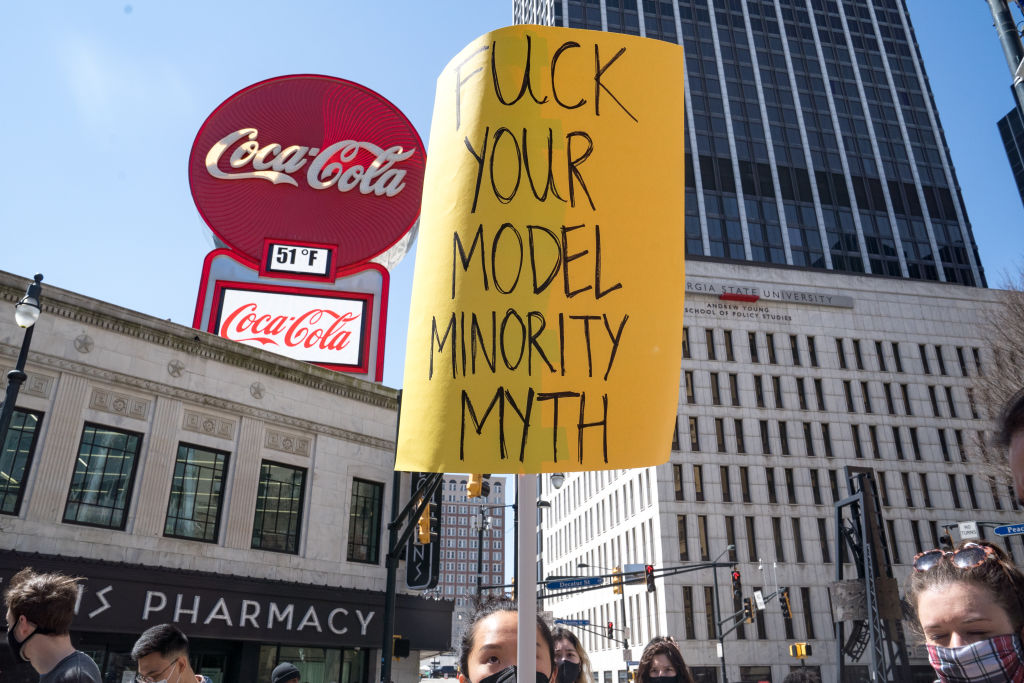
Amber: Watching the work that you have created in the last couple of years—both as a writer and a researcher, at the nexus of thrilling storytelling and unearthing these really hard truths—has been pretty profound. This is where, in my mind, for women, it’s not really a luxury to write about these things: This is not a hobby; this is an act of survival. How do you feel about that statement?
Min Jin: I think the word “survival” is so important because right now we are seeing girls and women under threat—especially poor girls and poor women, and that cuts across race, and it cuts across boundaries, and regions. We're seeing political actors trying so hard to destroy the lives of girls and women. And I guess that's the reason why I feel rather impassioned to make sure that our alliances get stronger, not [made] weaker by minor differences that we can definitely talk out.
Amber: I love that so much. And I needed to hear that because it has been a hard couple of years, as it has been for everybody. Obviously, I've dealt with my own feelings about the movement-building process and activist spaces that feel like we're just ripping each other apart without the context of nuance and how difficult this work is. There is a world out there that just wants us not to exist and not to thrive. And also on a deeper, sadder level, not to love each other.
What you just said reminded me of this episode [of the On Being podcast] I just listened to [featuring] my friends Tarana Burke and Ai-Jen Poo. And there's a thing that Tarana said: "I don't think we can have movements that have liberation politics that don't have a politic of grace."
Min Jin: Amen. It should be exactly as Tarana Burke said, a “liberation ethic,” because it's not just me getting whatever men get. It's actually for all of us to be free to be who we're supposed to be. And that's a very revolutionary point of view.
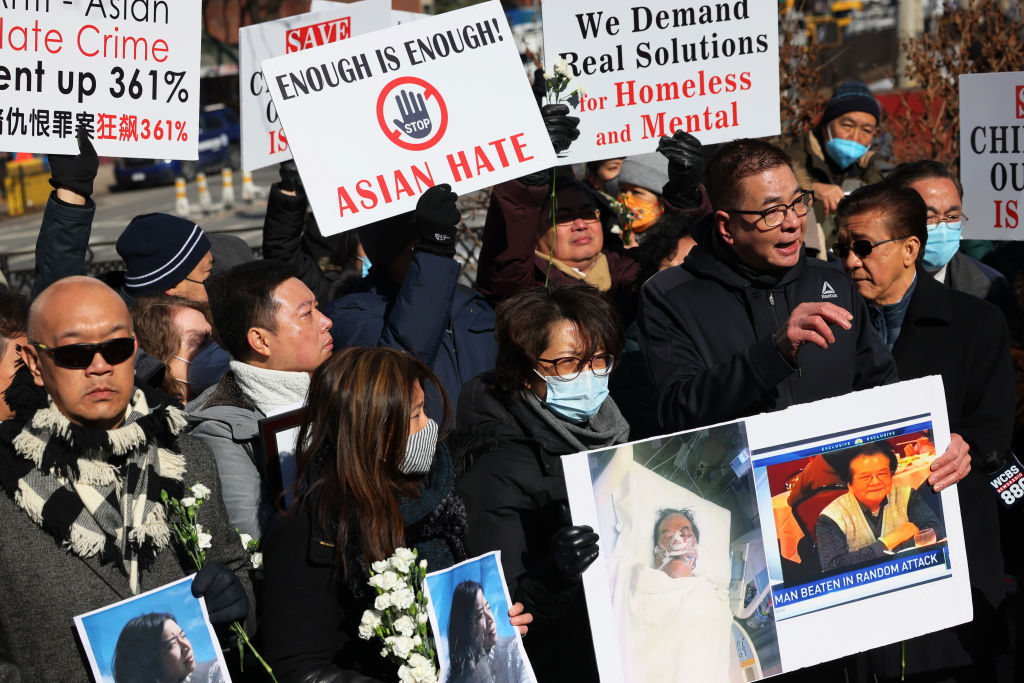
Amber Tamblyn: What I've learned is, in any [movement] work, there's a very delicate balance between honoring the wisdom and experience of your elders, and also breaking free of that to find what is important and needed in the current culture and climate.
Min Jin: Well, it's funny, I'm 53 years old. I'm the middle girl of three girls in my family. My mother always worked and she earned money for our family, which was important. But then also I felt that our father really supported our full capacity as young women. So very often people talk about the patriarchy of East Asian Confucian cultures, and obviously, true. But my father— because he has three girls—I think he ended up feeling like, yes, I want you to be able to cook well. Which is obviously sexist. And yet, he also felt like you should be able to do whatever you want to do because my girls are the best.
He used to say, "Oh if a boy doesn't want to marry you or date you because you're smart and you're educated, know this: He will have dumb children."
Amber: Oh shit. That's amazing.
Min Jin: Right? But my dad said that! I grew up in a very feminist household. So I'm always surprised when people say things about Asians and Asian Americans being sexist, because I'm like, "Well, that wasn't my experience."
Amber: That brings me to my [last] question that I wanted to ask you personally, but also for anyone reading this interview who's also upset and outraged by [the rise of anti-Asian violence]. What is a very simple way to be more involved, to be more engaged?
Min Jin: The Alliance is an organization that supports victims [of anti-Asian violence] who wish to come forward. If they don't have money for a lawyer, they have all these pro bono lawyers who are willing to do it. But very often the victims will not come forward. I think that you understand this very well as somebody who cares about the Me Too movement, [but] very often Asians and Asian-Americans are not believed. So, first of all, can you believe it when someone tells you, I'm afraid to take the subway, I'm afraid to walk down the street because somebody might attack me in a poor neighborhood? Secondly, find the [political] candidates who care about the core of your community.
The third thing is really simple: Sometimes, if you feel like it, you could offer to walk your friend somewhere. Sometimes it is a matter of reaching out, talking to the person who feels deeply ignored, [and] making him, or her, or them visible in your life. There are moments in recognition that we can give to each other, which can build a world and counteract all that cruelty.
Amber: I love that. What gives you hope about the future?
Min Jin: Well, I'm a mother and I'm a professor of young people, so the next generation obviously gives me hope. And what also gives me hope is that I come from a long history of women who are fighting for good things. And it's so important to understand that we're not alone in this. For me, I keep thinking about how many beautiful friendships I have found in the movement, [and] how many people I really adore, whose laughter I speak to when I'm having a hard time. Having a shared, common purpose is a wonderful way to build friendships. So that gives me a lot of hope.
This interview has been edited and condensed for clarity.


